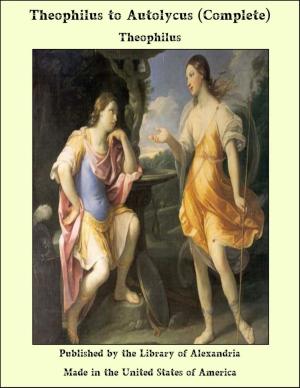The Church of St. Bunco: a Drastic Treatment of a Copyrighted Religion
Nonfiction, Religion & Spirituality, New Age, History, Fiction & Literature| Author: | Gordon Clark | ISBN: | 9781465558152 |
| Publisher: | Library of Alexandria | Publication: | July 29, 2009 |
| Imprint: | Library of Alexandria | Language: | English |
| Author: | Gordon Clark |
| ISBN: | 9781465558152 |
| Publisher: | Library of Alexandria |
| Publication: | July 29, 2009 |
| Imprint: | Library of Alexandria |
| Language: | English |
The purpose of this book is not to deny the power of mind over matter, or of the human mind over the human body, but to show that the foolish and pestilent thing termed "Christian Science" is a leech fastened upon these great truths, mostly, if not wholly, to batten on them. There is no use of saying this to "Christian Scientists" themselves—an obedient chain-gang in hypnotic servitude. But people who are not already "in Science" (to use the shibboleth of those who are), ought to be prompted not to get there. The best way in general, I think, is to show that even the historical and biographical claims at the base of the movement are false. If the personal veracity of the head of a church cannot be trusted, "divine revelations," "miracles" and "mental medicine," proceeding from such a source, will naturally be accepted only by the very soft, or else by the very hard for solid considerations. Is there no sincerity, then, in "Christian Science"? Of course there is. Even the "discoverer and founder" of it undoubtedly believes certain of its asseverations. Mrs. Mary Baker Eddy must be credited, for instance, with the conviction that she has some knowledge of "metaphysics"—a conviction that is nothing worse than a pitiable mistake, which is exploded here at some length. When, as a result of this mistake, she teaches that matter is nothing—not even a condition of anything—only sincerity can account for such lunacy. Yet herein "Christian Science" has its whole rational, or rather irrational, breath of life. Some "Christian Scientists" sincerely believe in an equivalent for "black magic." As, in their view, "concentration of mind" can cure disease, they think it can also throw disease upon enemies, or upon backsliders from "science." It has been suggested even to the present writer that illness might be cast upon him if he antagonized "the true faith." According to certain dissidents from "Christian Science," "black magic," though with much talk of "chastening love"—(every crime of religious hypocrisy is always committed in the name of "love")—has been persistently tried on heretical wanderers. In the natural course of time some of them are dead; but those whom I have met are not only living, they are comfortably fat
The purpose of this book is not to deny the power of mind over matter, or of the human mind over the human body, but to show that the foolish and pestilent thing termed "Christian Science" is a leech fastened upon these great truths, mostly, if not wholly, to batten on them. There is no use of saying this to "Christian Scientists" themselves—an obedient chain-gang in hypnotic servitude. But people who are not already "in Science" (to use the shibboleth of those who are), ought to be prompted not to get there. The best way in general, I think, is to show that even the historical and biographical claims at the base of the movement are false. If the personal veracity of the head of a church cannot be trusted, "divine revelations," "miracles" and "mental medicine," proceeding from such a source, will naturally be accepted only by the very soft, or else by the very hard for solid considerations. Is there no sincerity, then, in "Christian Science"? Of course there is. Even the "discoverer and founder" of it undoubtedly believes certain of its asseverations. Mrs. Mary Baker Eddy must be credited, for instance, with the conviction that she has some knowledge of "metaphysics"—a conviction that is nothing worse than a pitiable mistake, which is exploded here at some length. When, as a result of this mistake, she teaches that matter is nothing—not even a condition of anything—only sincerity can account for such lunacy. Yet herein "Christian Science" has its whole rational, or rather irrational, breath of life. Some "Christian Scientists" sincerely believe in an equivalent for "black magic." As, in their view, "concentration of mind" can cure disease, they think it can also throw disease upon enemies, or upon backsliders from "science." It has been suggested even to the present writer that illness might be cast upon him if he antagonized "the true faith." According to certain dissidents from "Christian Science," "black magic," though with much talk of "chastening love"—(every crime of religious hypocrisy is always committed in the name of "love")—has been persistently tried on heretical wanderers. In the natural course of time some of them are dead; but those whom I have met are not only living, they are comfortably fat















